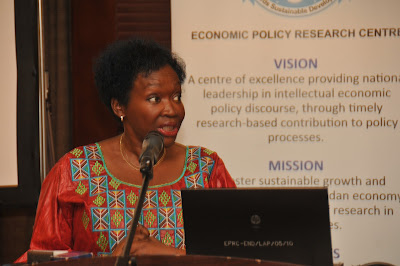Uganda’s oil for infrastructure development says Kiwanuka
 |
| Maria Kiwanuka Minister of Finance |
It
will, therefore, insist on transparency and accountability as well as balancing
of interests to ensure sustainable and inclusive management of petroleum
resources as part of the transformation process of the Ugandan economy.
To
promote transparency, the Government has already put in place a number of oil
policies, laws and institutions to ensure prudent management of the oil and gas
resources.
In
particular, the Parliament has already discussed or is in the process of
discussing the following legislation; Petroleum Exploration and Production;
Petroleum Refining, Gas Processing and Conversion, Transportation and Storage;
The Public Finance Bill 2012, which contains the petroleum revenue management
framework.
Kiwanuka
emphasized that dialogues between policy makers, civil society organisations,
the petroleum sector operators and the general public are crucial to dispel
negative myths and legends that accompany petroleum discoveries and to diffuse
the distrust that ensures.
This
was at a conference organized by the Economic Policy Research Centre (EPRC),
Kenya Institute for Public Policy Research and Analysis (KIPPRA-Kenya), and
Africa Growth Initiative (AGI) for organizing this regional forum on managing
Petroleum resources in East Africa.
Kiwanuka stressed that the Government recognizes
that the oil and gas sector is only part of the economy of Uganda and will be
depleted. On the other hand, the other sectors such as agriculture,
manufacturing and tourism are renewable.
Thus,
the Ministry of Finance, Planning and Economic Development believes that, the
exhaustible petroleum resources or the black gold underground must facilitate
expansion of the renewable resources or the green gold above the ground.
“The
revenues from oil and gas are only part of the funds required to pursue
Uganda’s development agenda hence the need to keep on course with economic
diversification,” said Kiwanuka.
“Oil
and gas revenues only give the country an unprecedented opportunity to
fast-track the investment agenda within a consistent macroeconomic framework
and utilized on projects approved by Parliament.”
Therefore,
the Public Finance Bill 2012, which provides for the management and utilization
of oil revenues within the broader framework of the Public Finance policies,
laws and regulations will be used.
Speaker
after speaker, they talked of the so-called “Oil Curse” and its challenges
embedded therein, which include loss of competitiveness due to high inflows of
foreign exchange and volatile commodity prices leading to inflation and loss of
purchasing power.
But
Kiwanuka said for the oil revenues to be spent wisely, their needs to be a public
dialogue that is continuous and frank among all the stakeholders: government,
petroleum sector operators, CSOs and the general public.
Savings
for future generations will also not be done but Uganda would invest in
infrastructure – a durable asset base that will increase access to reliable
power and therefore lower the cost of transport and doing business.
It
will also maintain and enhance the non-petroleum revenue base so as to sustain
the economy beyond the petroleum period as well as emphasize transparency and
accountability in management of the petroleum revenues.
“Accordingly,
I confirm that Uganda will be ready to incorporate a regional dimension to our
petroleum strategy,” said Kiwanuka. “Such a strategy calls for informed discussions based on
research and evidence on how best to efficiently and effectively manage
petroleum resources at the regional level.”


Comments
Post a Comment